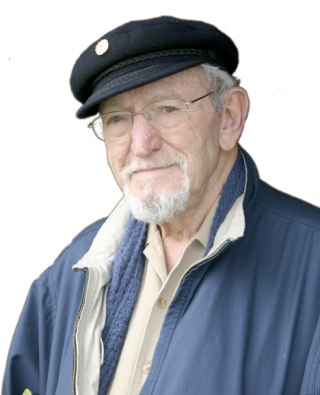The production of five wonderful examples of Ernest Pugh’s playwright talents at the San Juan Community Theatre was a well-deserved tribute, Jan. 16-17.
It takes a keen eye and sharp ear to have such talent. And, of course, an equally talented cast and crew to bring the playwright’s drama to powerful life.
Director Susan Williams played Irma Jean in “Miss Dixie’s Boarding House,” a story of the conflict of dreams and disappointments between her and Faye (Natalie King), who wants to take off for the big city. The conflict is effectively resolved as a failed traveling salesman offers Faye a lift out of town, in the quickest few minutes of theater you’ll ever see. Doug Schirmer’s performance as the epitome of failed salesmanship was right on target, as was the great Southern accents of Miss Dixie (Lorie Narum) and the two adversaries.
“Last Bus to Hopewell” another work of the 1950s, has Warren Baehr and Gretchen Gubelman, two more veterans of our local stage, in another example of the down-to-earth facts of life people face in the real world according to Ernest Pugh. You can almost imagine Ernest being somewhere in that bus depot eavesdropping and observing as it took place.
In “Reflections,” two Julies — Julie Greene and Julie Laidlaw — play younger Jean and older Jean as the Past, Present and Future are brought to life, as older Jean states: “I watch the receding tide of days like I am stranded at the dark high water line of memory.”
After intermission, another scene, set in the 1800s, has Lin Pearson (John Roy), a Civil War officer, returning to visit the area he had betrayed during the war, awaited by Pat Rishel (Nettie), holding a pistol under her apron to exact revenge. Pearson’s love for his beginnings and reasoning for his actions thaw the icy reception he receives. Whew! It ends as she secretly slips the pistol into the sewing basket she held and Pearson walks away. You couldn’t help but wonder if John Roy knew and would not have blamed her if she used it.
But it was the final 30-minute play, “Moon Wheel: A Romance,” that blew me away. Taking place during the Inquisition, this involves a church which had a sculpture of Adam and Eve flagrante delicto or deshabille (I didn’t quite catch which). The Church sent an Inquisitor (Greg Hertel as Albertic) to investigate if the sculpture was pornographic and discovered that Gislebertus (Dorian Oliver) was a humble servant of the Lord and thus exonerated. Shannon Kelley, Daniel Finn, Kamala Chambers, Patty Bair and Tanya Williamson were all wonderful in their metaphysical roles. Finn might never stand straight again after spending all that time lumbering around like the Hunchback of Notre Dame.
Speaking of Finn, his wife Therese did a superb job as emcee throughout.
After the show, I asked Pugh where he dreamed up that plot on the Inquisition. He laughed and told me he had seen a picture of the Eden scene and did some research. It still exists, but there is no written history of how it came about. Leave it to Pugh’s lively imagination — voila, he was able to make history itself.
Of such is history and great theater combined. Your tribute was well deserved, Ernest. You’ve made a great difference in our 18 years of seeing your fine works.




